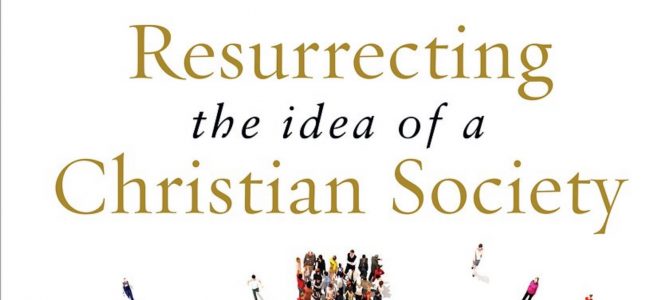
We are experiencing a new kind of class warfare, and the Christian voice in the public square is needed now more than ever, says R.R. Reno in Resurrecting the Idea of a Christian Society. In the book he argues that the new kind of social politics are designed to further a duplicitous vision for society that empowers the upper classes, while providing the illusion this is furthering human progress. And this all comes at the cost of the well-being of the lower castes of society.
Any reader familiar with his “Public Square” column in First Things magazine is likely aware that he has been building this case for some time, warning that the very institutions designed to give the poor a leg up are the new targets in the culture wars. Resurrecting the Idea of a Christian Society is a resounding exclamation point to the thoughts that he has been solidifying in his column.
Reno fleshes things out by juxtaposing the top 20% way of life against the bottom 20%, which he calls Belmont and Fishtown respectively. Cold hard statistics show the moral reckoning that Fishtown experiences as a consequence for the moral deregulation to advance the “soft hedonist” agenda of Belmont. While Belmont continues to live as though they are planted firmly in the 1950s—where the church, the family, and the community are as strong as ever—Fishtown is experiencing record numbers of divorce, fatherless homes, addiction, and unprecedented unemployment among able bodied men.
Through moral deregulation, Belmont is further able to enjoy the comforts of a relativistic system that facilitates prosperity for a class of people who still have community, unrivaled discipline, and access to rehab clinics when all else fails. All the while, this moral deregulation is making life for the poor a living hell.
A recent study that examined religious affiliation and social class points toward the idea of his book by showing that according to a person’s place in society typically determines what, if any, kind of church a person attends. The churches that adhere to the most fundamentalist beliefs and are hard lined on social issues tend to be attended by people from the working class and altogether less prosperous economic backgrounds. Connecting these dots to Reno’s book, the fundamentalist narrative is more wholly embraced by those who need an authority unapologetic about its position on drug or alcohol use and marital infidelity, while the upper classes embrace the churches where love and forgiveness is always the answer.
But looking at what Christian groups are most under attack in the culture wars, it is not Methodists or Episcopals who are fighting the courts to practice their beliefs in the public square. The churches who are willing to change with the culture are the ones most predominant in Belmont and least likely to be taking fire in the culture wars.
This is all a relatively new development in the West, Reno asserts. Whether it was manifest as divine kingship or just civic duty, our elite classes have historically considered it their responsibility to be the moral trendsetter. Now the sexual revolution and globalization seem to be the primary instigators behind the rebellion of Belmont against this understanding.
As a microcosm of culture, our elite colleges and public schools across America tend to magnify these moral shifts the most. What might the shifts look like? Tampons in the men’s rooms at Brown University? Trigger warnings for students whose lives are so foreign to the idea of struggle that the mere existence of confrontation can be almost unmanageable? College administrators who have to create flow charts to explain to students what Halloween costumes are offensive? These are problems that can only exist in communities without many other problems.
Consider Reno’s point: when is the last time anyone has read the profile in a prominent newspaper of a gay couple preparing to take vows who are employed as janitors or do shift work at the local factory? Or have we even seen a story on an inner-city school fighting for non-gendered pronouns or implementing systems to reduce their carbon footprint? These are not the issues of a class of people still struggling with poverty, atomization, and single-parent households.
Reno rightly notes that Fishtown depends on this moral guidance in structuring their lives in a successful manner. Forced compliance with Belmont’s pet policies only saps resources and erodes the institutions that Fishtown needs for its children to ever have a chance at moving on up to Belmont.
One of the more fascinating ideas in this book is how we struggle to define how this deregulation is being imposed from top down. “Moral relativism” is a phrase one often sees bandied about, but Reno suggests this is an incorrect diagnosis. According to Reno, a moral relativist does not live inside a 1950s-era cocoon where people marry, stay together, have children, and enable them to navigate life in the upper classes of society.
Instead, we are living in an era of nonjudgmentalism because in practice, relativism is for thee, not for me. While citizens of Belmont may handle the legal accessibility of various intoxicants generally well and keep their adulterous escapades discreet, it is access to the same substances and womanizing that condemn many others to the confines of Fishtown.
Reno also shows that when Belmont issues such as doctor-assisted suicide enter the public imagination, they rarely do so without producing side effects, in this case an accompanying increase of suicides in general by nearly 30 percent between the ages 35 and 64. Belmont is given the rich man’s luxury of deciding how and when he dies, or what Reno observes is “a soft landing for a high achiever who’s been the pilot of his own life.” But while “cultural change affects everyone, and there are costs paid by others.”
What should likely not come as any surprise to most believing Christians is that contemporary western society needs Jesus, and specifically the adherence to Christian values. It took Christians to end the cruel gladiator shows some 16 centuries ago; it took the growth of Christian families to end the practice of infanticide in ancient Rome; and it took Christian institutions centuries to create the hospital system we depend on today. Though Christians may be pushed to the edges of public life, our systems of morality are needed now more than ever.
Reno is careful to make clear he is not suggesting a theocracy, but rather that the Christian needs to be the leaven of society. He implores the reader to push back against the nonjudgmental will that the upper classes of society has impressed upon us. “We need to criticize the critics for their often unconscious but all too real service of the powerful,” Reno writes. “A Christian society judges nonjudgmentalism unjust.” He further explains that the preferential option for the poor requires the Christian to abandon nonjudgmentalism for the sake of the “least of these.”
One of the best aspects of this book is the optimism with which Reno approaches the current state of affairs. He does not mince words about the challenges we face in reasserting the values that made America great, but nor does he suggest it may be time to tuck tail and retreat. For Resurrecting the Idea of a Christian Society may very well be among the most important books of this year. It both highlights the challenges of the twenty-first-century Christian and provides avenues and hope for reasserting our place as the conscience of American life.
True freedom, as taught by Jesus Christ and championed by the apostles, requires both love and an ability to say no. Although there is nothing new about Christians saying no to the corrosive habits of a society hell-bent on social libertinism, we are facing a new kind of hostility for these beliefs. Our place at the public table requires our willingness to assert Christian freedom as though the widow and the orphan depend on it, because their fates surely depend on our courage as much as our compassion.









